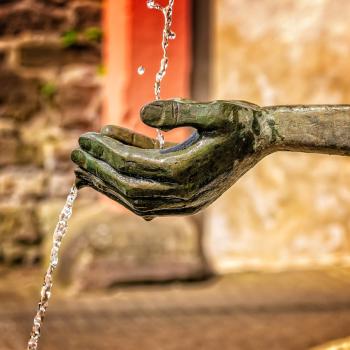There is nothing more important for a person to learn—and no lesson suffering is more suited to teach him—than his own nothingness. Suffering does not make us stronger, but neither does it sap our strength until we are ready to find convenient consolation in God. Rather, suffering reveals that we have been weak all along, that our strength is an illusion and our sense of permanence and invulnerability has always been a façade. Suffering shows us that we are powerless to secure what we are most eager to possess, that everything the world has given can be swept away in the blink of an eye.
At a recent event at the Pew Forum, I asked Hitchens whether he ever doubted his views on God and faith. Immaculate certainty is an essential part of his public persona, but was he ever troubled in the dark of night by the possibility that there is a God who loves him? Hitchens answered (as he did in God is Not Great) that he is one of those, referenced by Pascal, who is so constituted that he simply cannot believe. (He is misusing Pascal here, but that's another matter.) Like any skilled debater, Hitchens prides himself on his ability to argue both sides of an argument. In the case of Christianity, he said, he could not even begin to make it seem credible.
Yet I did not ask whether he could begin to believe the Christian gospel. I asked whether he could begin to doubt his own standpoint. Hitchens, asked whether he ever doubted himself, spoke instead of the doubtfulness of a view that was not his own. The nineteenth-century Danish writer Søren Kierkegaard once wrote that false doubt is boastful and delights in pointing out the doubtfulness of other things. True doubt, the doubt that saves, doubts itself over all else. This is what suffering can teach. Suffering shows us our own horizon; it lays bare our weaknesses; it reveals that we, even in those seasons when we felt self-sufficient and invincible, have always been utterly dependent upon God for all things.
Just as importantly, suffering teaches the sufficiency of God. Shortly after I broke my neck, as they wheeled me into the hospital and drilled a halo into my skull, and then throughout my stay in the hospital, I was filled with an inexplicable joy. In one moment I laughed uncontrollably; in another I wept joyfully, shattered into a thousand pieces by an overwhelming sense of gratitude. I had seen in a single blessed glance how weak and powerless and empty I am by myself—and how strong and sufficient and rich I am in God. I know of many who have had the same experience. When you see that the world cannot strip away the one thing needful, that nothing indeed can separate you from the love of God, it is a liberating and life-changing thing.
Finally, the reason so many find God in "the land of malady" is because Christ has made himself present there. The ancient faiths and philosophies recoiled at the notion that God should enter into history in the agony and effluvia of birth, much less that God should be tempted in the wilderness or be spat upon or suffer and die upon a cross. Yet such is the revolutionary claim at the heart of the Christian faith, that God, in Christ, entered into the condition of suffering humanity. Even in the fiery furnace, even in the isolation chamber, the Son of God is there.
And God has not only made himself present in suffering; he has transformed it. God is no mere cosmic sympathizer, no Oprah in the Sky who claims to feel our pain but does nothing for it. Just as Christ has taken the sting from death by vanquishing its hopelessness, and achieving a new life beyond the grave, so Christ has taken the sting from suffering by filling it with purpose. The emptiness, the hopelessness, the loneliness are taken away. We do not find Christ in suffering. Christ finds us, if we are willing to be found, in the promise to work all things to good for those who love him and are called by him. Those who are willing will be refined in the furnace of affliction. And we know too that there shall be a last day for tears, beyond which there will be no more suffering.
Christopher Hitchens may or may not find the Way, the Truth and the Life in the midst of such extraordinary hardship. But it is there for him, waiting to be found. Suffering makes us visible to ourselves in all our poverty and powerlessness, and discloses the secret that the one thing needful can never be taken away, and in our suffering we may hear the call of the suffering Christ. Perhaps it is true, for Hitchens as for many of us, that the Way can be found nowhere else. Perhaps some have to pass through the valley of the shadow of death in order to learn that the Lord is their shepherd, whose goodness and love will follow them all their days and take them to dwell in the house of the Lord forever.





